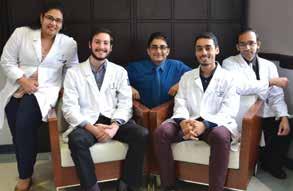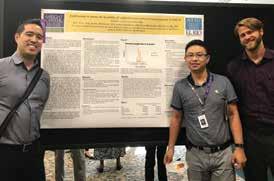
8 minute read
Graduate Medical Education
By partnering with like-minded organizations, we have created a comprehensive network of learning environments throughout northeast Pennsylvania and across the United States. We are a well-respected pipeline for recruiting and retaining compassionate, competent physicians with relevant, 21st century skill sets and the desire to serve their patients and their community.
72% Of our most recent graduating class of Teaching Health Center-funded National Family Medicine residents, 72 percent chose to practice in a medically underserved area with many signing on in the early stages of their residency. In fact, five of our second-year National Family Medicine residents in Washington, D.C. — Dr. Nickia King, Dr. Estevan Rivas, Dr. Hannah Herman, Dr. Tiffany Garrett and Dr. Rachel Gougian — have already signed contracts with Unity Health Care to continue working within the Community Health Center in which they trained after they graduate in 2019.
Community-Based Primary Care Residencies and Specialty Fellowships for Sustainable Physician Renewal Unifying Communities through our Graduate
Medical Education Safety-
The Wright Center’s Internal Medicine, Family Medicine and Net Consortium Model Psychiatry Residencies, as well as our Cardiology Fellowship, were designed to empower residents as innovators and nimble leaders Through our innovative Graduate Medical Education Safety-Net Consortium model, responsive to the needs of the community they serve. Within our community stakeholders, resources non-profit Graduate Medical Education Safety-Net Consortium, our and assets align to collectively address trainees are immersed in diverse community venues where they are foundational healthcare issues by advancing most needed, increasing their long-term likelihood of working in such local solutions with national implications. settings after completing their training. Our training model follows the Regionally, our strong affiliations with national Beyond Flexner movement, focused on training community- Commonwealth Health System, the U.S. minded health professionals as agents of more equitable healthcare. Department of Veterans Affairs and Our regional residents and fellows train within Luzerne, Lackawanna, Geisinger, as well as multiple regional learning environments including Maternal Wayne and Pike counties and our National Family Medicine Residency and Family Health Services, Pike Family (NFMR) learners train at 1 of 5 Federally Qualified Health Center Health Center, Rural Health Corporation, (FQHC) partner sites across the United States. Under our innovative Scranton Counseling Center, Scranton consortium model, the NFMR learners are supported by The Wright Primary Health Care Center and Wayne Center, the educational infrastructure of A.T. Still University School of Memorial Community Health Center allow Osteopathic Medicine in Arizona and the osteopathic training support us to provide diverse, innovative learning of Still OPTI. Dr. Meaghan Ruddy was selected as the Director of environments for trainees. The strength Medical Education in December 2017 to lead this unique and of the training partnerships was further pioneering program. Plans are in place to expand the NFMR training demonstrated as a successful ACGME model as funding becomes available in the future. Clinical Learning Environment Review (CLER) visit was hosted at Geisinger Community This past summer, our largest class to date — 63 residents and two Medical Center in the fall of 2017. fellows — completed their training with us. Of the 18 NFMR physician graduates, 13 confirmed employment in community-based health systems, committing to practicing in underserved areas across the country. Of the 47 physicians who completed their residency training in northeast Pennsylvania, a total of eight confirmed employment within northeast Pennsylvania. In June 2017, we welcomed 65 interns into The Wright Center’s program for a total of 185 residents/fellows across all regional and national programs: 4 PSYCHIATRY RESIDENTS 9 CARDIOVASCULAR DISEASE FELLOWS 34 FAMILY MEDICINE RESIDENTS (REGIONAL) 48 FAMILY MEDICINE RESIDENTS (NATIONAL) 90 INTERNAL MEDICINE RESIDENTS We continue to work closely with Geisinger Commonwealth School of Medicine to foster a pipeline of physicians committed to serving our region. In 2017, we engaged two Geisinger Commonwealth doctors into our residency programs, including Dr. Alex Slaby and Dr. Graham Yeager. Dr. Graham Yeager, first year internal medicine resident, is certain he wants to spend his days practicing in the community he knows so well. The son of a physician and registered nurse, Dr. Yeager is a graduate of the University of Scranton and Geisinger Commonwealth School of Medicine and he’s confident he wants to follow in his father’s footsteps. His father believes his son’s personal life plan exemplifies the spirit which led to the formation of what is now The Wright Center. “I have been involved in teaching and mentoring “The decision to stay and practice right here in northeast Pennsylvania the residents from the beginning of Scranton-Temple was never much in doubt throughout my life, as this is the place I Residency Program and its subsequent transition to The know the best, the people who I know and the culture that I feel most Wright Center,” Dr. Henry C. Yeager, volunteer faculty, comfortable with. This is the only place I’ve ever called home.” said. “Many of those who trained here and remain DR. GRAHAM YEAGER here are among our physician leaders in the medical FIRST YEAR INTERNAL MEDICINE RESIDENT community today. That Graham has chosen this path is very gratifying to me as a father and as a physician.”
Our National Family Medicine Residency learners train at the following FQHC partner sites across the country: El Rio Community Health Center, Tucson, AZ; HealthPoint, Auburn, WA; HealthSource of Ohio, New Richmond, OH; Unity Health Care, Washington, D.C.; and Virginia Garcia Memorial Health Center, Portland, OR.
GRADUATE MEDICAL EDUCATION

The Wright Center welcomed four learners into our community-based, four-year, ACGMEaccredited Psychiatry Residency, developed in alignment with Geisinger Commonwealth School of Medicine’s Behavioral Health Institute, in July 2017. In its inaugural year, this residency, led by Program Director Dr. Sanjay Chandragiri, further integrated behavioral health services into primary care environments, promoted preventive screenings and fostered a team-based approach to care. In 2018, our Graduate Medical Education offerings will expand once more, welcoming our first learner into the newly ACGMEaccredited Gastrointestinal Fellowship, led by Program Director Dr. Pardeep Bansal. The ACGME application was approved in the fall of 2017 and Dr. Mladen Jecmenica, Hospitalist and Associate Program Director of The Wright Center’s Internal Medicine Residency, will be the first learner to enter this fellowship when it begins in the summer of 2018.
An Evolving Journey toward a Unifying Single Accreditation System
Graduate Medical Education accrediting bodies, the Accreditation Council for Graduate Medical Education (ACGME) and American Osteopathic Association (AOA), are making great strides toward a Single Accreditation System, intending to establish consistent evaluation and physician competencies to impact public health and improve our healthcare systems as a whole. The Wright Center currently offers robust osteopathic training opportunities and is proud to be amongst many sponsoring institutions aiming to evolve a collaborative and unifying Single Accreditation System for America under the able stewardship of the ACGME. “Our allopathic and osteopathic residents currently learn side by side, so the Single Accreditation System will help us to further streamline our processes, evaluations and milestones,” Dr. Timothy Burke, Osteopathic Internal Medicine Program Director, said. “Although this is a change in accreditation, we are committed to maintaining the principles of osteopathic medicine for the residents who choose to train with us.” In December 2017, the ACGME approved our request to merge our existing Osteopathic and Allopathic Regional Family Medicine programs, expanding our Regional Family Medicine program from 21 to 36 slots effective July 1, 2018. In addition to bolstering educational opportunities for the residents, this program merger paves the way for development of a Wright Center primary care interprofessional workforce and patient care clinical hub to be established at 501 South Washington Avenue, Scranton. This new clinical learning environment will open to patients and learners in late 2018.
“It is important to recognize that benefits to resident education ultimately result in improved quality of patient care. I look forward to the challenges of melding two educational cultures into one which will respect and encompass the ideals of allopathic and osteopathic medicine to achieve what has always been a shared purpose: providing patient-centered and focused quality primary care.”
DR. MAUREEN LITCHMAN | FAMILY MEDICINE PROGRAM DIRECTOR
Stewarding Multi-Source Federal Funds to Support Innovation in Graduate Medical Education
The Health Resources and Services Administration (HRSA) continues to recognize the great need for primary care doctors and right-venue healthcare. As a pioneering Teaching Health Center Graduate Medical Education (THCGME) consortium, The Wright Center serves as a steward of federal resources and encourages residents to actively serve the nation’s underserved patient population. The THCGME program has successfully ignited and leveraged clinical educational environments in numerous community-based venues across the country, and especially in northeast Pennsylvania, while delivering competent, public health-minded physician leaders. Reaffirming its investment in the nationally-significant THCGME initiative that began in 2011, HRSA awarded The Wright Center $17.1 million for the 2017-18 Fiscal Year. The Wright Center has been awarded $65.9 million in continued HRSA funding since the THCGME program began in 2011 and continues to lead local and federal advocacy efforts to promote resident training opportunities in community-based settings to address America’s provider shortage, misdistribution and related health disparities. “National Family Medicine has come a long way in its first five years of existence to establish a record of excellence in training and outcomes,” Dr. Larry LeBeau, Program Director, said. “As of today, NFMR graduates have a 100 percent pass rate on The American Osteopathic Board of Family Physicians specialty board exam and 54 percent have gone on to practice in underserved settings. The program remains focused and committed to fulfilling our mission of primary care workforce expansion with a special emphasis on meeting the needs of underserved populations.”
Countries 27: represented by our current trainees 98.4%: 7,810:
680: $65.9m: 120+: 8: 72%:
Wright Center graduates to date Resident board pass rate (all programs) in HRSA federal funding received since 2011 Volunteer faculty members Residency/fellowship applications received
Third-year residents matched into fellowship positions in critical care, cardiology, nephrology and infectious disease specialties of the recent graduating class of Teaching Health Center-funded National Family Medicine residents chose to practice in a medically underserved area
We continue to develop collaborative learning opportunities within our National Family Medicine Residency. In its second year, The El Rio/Wright Center Virtual Health Research Fair was a perfect example of these efforts, as learners shared their Community-Oriented Primary Care research with attendees across the country who dialed in for the event.


